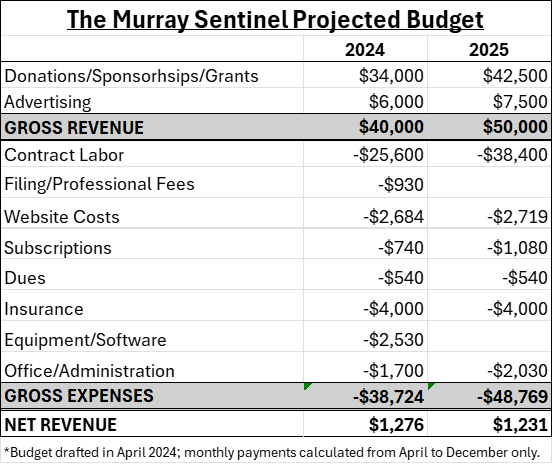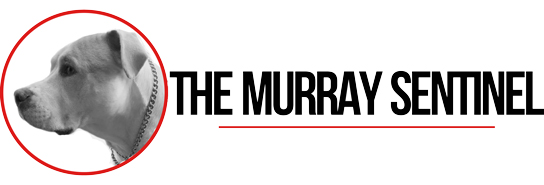Meet Brody Jones, official mascot of The Murray Sentinel

Brody is the quintessential “watchdog,” which is synonymous with sentinel. He is the embodiment of vigilance, loyalty and security, and what could be more patriotic than an American bulldog? He doesn’t attack; he doesn’t give chase. He simply notifies and stands firm as a buffer between his people and any potential threat. The goal of this media outlet is to protect and serve our community in the same fashion.
Our Mission
The mission of The Murray Sentinel is to promote, facilitate and inspire a broad spectrum of civic engagement through providing the Murray-Calloway County community a truly independent, locally-focused news source that offers an inclusive and representative approach to maintaining a public well-informed of the happenings and inner-workings of the “friendliest small town” we call home.
Our Policies
Code of Ethics
The Murray Sentinel conforms to and abides by the Society of Professional Journalists Code of Ethics.
Corrections Policy
Accuracy in reporting is a core value at the Sentinel. As such, we strive to provide the most accurate information available. Stories may be edited after publication for the purpose of clarifying ambiguous verbiage or correcting grammar and syntax errors without posting a correction notice; however, any substantive change made post-publication is noted in the text with an asterisk, and a complete correction is provided below the story.To report an error or request a correction, you may use the contact form or email jpaine@themurraysentinel.org.
Anonymous Sources Policy
As professional journalists, our credibility is our most prized professional possession. To protect both their own credibility and that of their stories, our reporters exhaust every possible avenue to confirm and attribute information before relying on anonymous sources. However, if the only way to publish a story of importance to the public is to use anonymous sources, we believe that we owe it to our readers to identify the source as clearly as possible without identifying the person who has been granted anonymity.
Before agreeing to grant a source anonymity, reporters, in conjunction with the editor, carefully weigh sources’ motives for requesting anonymity and clarify any and all conditions attached to the exchange of information.
Editorial Independence Policy
We are committed to transparency in every aspect of funding our organization and subscribe to the standards of editorial independence adopted by the Institute for Nonprofit News.
Our news judgments are made independently – not based on or influenced by donors or any other revenue source. We do not give supporters the right to assign, review or edit content. We will not accept funding from any source whom our Board of Directors deems to present a conflict of interest with our work or compromise our editorial independence.
Our organization retains full authority over editorial content to protect the best journalistic and business interests of our organization. News coverage decisions are wholly independent of sources of all revenue. Acceptance of financial support does not constitute implied or actual endorsement of donors, sponsors, or grantors or their products, services or opinions.
Our organization may consider donations to support coverage of particular topics, but our organization maintains editorial control of the coverage. We will cede no right of review or influence of editorial content, nor of unauthorized distribution of editorial content.
Funding Transparency Policy
The trust people place in our reporting is our greatest asset. As such, we follow a practice of being transparent about who funds us and pays for that reporting, as one important way we preserve that trust. Being transparent about our funding means that anyone in our community can know how our work is funded.
As a 501(c)(3) nonprofit that operates as a public trust, we do not pay certain taxes. We will post our annual IRS filings on our website.
We accept tax-deductible donations, sponsorships and grants from individuals, organizations and foundations to help with our general operations, coverage of specific topics and special projects. We may receive funds from standard government programs offered to nonprofits or similar businesses. We also offer limited advertising opportunities for local organizations and businesses.
Occasionally, we accept sponsorships on special projects or coverage. Such coverage will be clearly labeled, and sponsors will be prominently disclosed, at the top of the story. We never publish advertorials.
Accepting financial support does not mean we endorse any advertiser, sponsor, grantor or donor or their products, services or opinions.
We make public all revenue sources contributing $5,000 or more per year. As a news nonprofit, we avoid accepting charitable donations from anonymous sources, government entities, political parties, elected officials or candidates seeking public office.
Donor Transparency Policy
We are committed to transparency in every aspect of funding our organization.
We accept gifts, grants and sponsorships from individuals, organizations and foundations to help with our general operations, coverage of specific topics and special projects. Accepting financial support does not mean we endorse any donors, sponsors or grantors or their products, services or opinions.
We avoid accepting donations from anonymous sources, government entities, political parties, elected officials or candidates seeking public office. Exceptions are unusual and carefully considered.
We understand and deeply appreciate the many reasons donors may generally prefer to keep their gifts anonymous. We understand and respect donors’ wishes for privacy; however, when it comes to journalism and trust in independent, nonprofit news organizations, like the Sentinel, we encourage donors to consider the greater good that comes from people knowing who stands behind the news we report.
We publicly disclose all sources of revenue, including charitable donations, contributing $5,000 or more per year. We are committed to restricting anonymous donations to less than 15% of our revenue.
The goals of these guidelines are to ensure that our journalism remains editorially independent and that the public can trust the news we produce, knowing the Sentinel is not dependent on or shaped by high levels of anonymous funding.
Editorial Collaboration Policy
The Murray Sentinel is committed to editorial independence and transparency in all of our reporting. As such, any collaborations with external partners on special projects must align with our mission and uphold our commitment to editorial excellence.
All collaborations must be disclosed to our readers, including the names of any partners and the nature of the collaboration. This disclosure will be made in a prominent location, such as the top of the story or on a dedicated page on our website, and will be clearly labeled as a collaboration. Any financial support for a collaboration will also be prominently disclosed.
Our editorial staff maintains full control over the content produced by our outlet as part of the collaboration. This includes maintaining control over the reporting, writing, editing, and fact-checking of all content produced as part of the collaboration.
We will not enter into collaborations that compromise our ethical, content, and reporting standards or that would give the appearance of a conflict of interest. This includes collaborations with partners that have a financial interest in the outcome of the story or that have a history of attempting to influence our reporting.
We will establish clear guidelines and expectations with partners before entering into a collaboration and pursue only those projects that advance our editorial mission. This includes discussing and agreeing upon the goals and objectives of the collaboration, as well as the roles and responsibilities of each party.
We will have an open line of communication with partners throughout the collaboration to address any issues or concerns that may arise.
By adhering to these guidelines, we ensure that our collaborations enhance our reporting and serve the public interest.
Conflict of Interest Statement and Policy
In a rural region, nonprofit board members are likely to have multiple connections to the communities where they live, work, and serve. Their civic engagement may range from PTA to choir practice; community theatre to sports events; grocery shopping to city council; granting loans and mortgages or raising funds for local causes; borrowing books from the library and running concessions at the farmers’ market. As a result, a written policy governing conflicts of interest is crucial to the integrity of the organization board and the board.
For The Murray Sentinel, the policy requires employees and board members to submit a list of potential conflicts of interest, to be updated annually and assessed for actual conflicts or the appearance of conflicts.
In assessing conflicts, the board will rely on consensus decision-making, engaging all participants and empowering the group to move forward with full support of the governing body. If it is deemed a conflict is present, the employee or board member will be excluded from further discussion and voting associated with the conflict.
A key question in evaluating potential conflicts is the nature of any benefit that might accrue from an individual’s connections, e.g., financial, political, professional, etc.
Conflict of Interest Policy
Strategic Plan
Projected 2024-25 Budget



